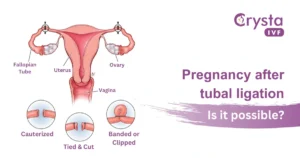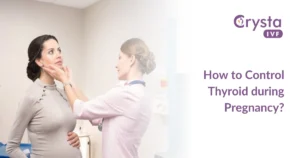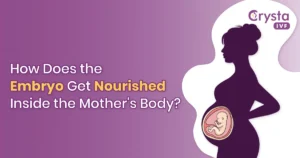With the advancement of technology, changes in the environment, and lifestyle choices, many couples struggle with conceiving and delaying parenthood. Some of them are even waiting to find the right partners. Most often, everyone is concerned about building their careers, getting a solid financial status, and much more before taking the responsibility of children onto their shoulders.
However, everyone forgets that running time makes conception more difficult. The more time passes, the more a couple experiences various fertility issues, eventually leading to female and male infertility. Thus, to inform every couple out there, this blog carries all the significant information on what consequences they will face when they delay parenthood and ruin their chances of conceiving and how they can deal with it.
Connection of age with fertility
Contrary to popular belief, age affects the ability to conceive or to get pregnant for both men and women.

Women’s age and fertility
A vital connection between a woman and her age is that a woman is born with all the eggs she will have in her entire lifetime. as her eggs start to age with her, decreasing in both quality and quantity, which is the essential criterion for a woman to get pregnant. Though maintaining good health can help you to some extent, it certainly cannot hide the impact of a woman’s age on her fertility and reproductive health and her delaying parenthood journey.
According to research, a woman in her early to mid-20s has almost a 25% to 30% chance of successfully conceiving each month. However, fertility begins to decline in a woman’s early 30s and continues to decline after age 35. By reaching the age of 40, the chances of getting successfully pregnant witness a downfall, and the percentage of women being able to conceive naturally remains at only 5%, indicating female infertility.
Men’s age and fertility
Many people believe that female fertility depends on age, but that is incorrect. Male fertility is stimulated by age and declines around the age of 40 to 45 when sperm quality begins to decline. Thus, it is clear that increasing male age lowers the chances of conceiving or getting pregnant successfully and leads to male infertility.
Read more: Male Fertility Facts: Know The Best Age to Become a Father
Pregnancy complications associated with age
The risks associated with pregnancy increase with age, too, such as the risk of miscarriage and fetal chromosomal abnormalities. Along with that, complications such as gestational diabetes, placenta previa (a condition where the placenta covers all or part of the cervix and increases the risk of the placenta detaching), cesarean sections, and stillbirth are also found to be more common among women of advancing age than younger women.
However, babies born to older fathers are found to be at greater risk of late stillbirth, premature birth, lower birth weight, low Apgar scores, and birth defects such as congenital disease and a cleft palate.
Signs and symptoms of infertility in men and women
Besides not being able to conceive naturally, or delaying parenthood journey, there are other signs too that indicate you cannot conceive naturally, such as
Signs of infertility in men:
- Complications with ejaculation may reduce sexual desire or cause trouble maintaining an erection.
- Inability to smell
- Decreased facial or body hair
- Lower sperm count
- Pain, swelling, or a lump in the testicle area
Signs of infertility in women:
- Irregular periods
- Heavy periods
- No periods
- Obesity
- Decreased sexual drive
- Skin issues and facial hair growth
How does assisted reproductive technology (ART) help combat infertility issues?
Infertility is a condition where couples fail to conceive even after having regular sexual intercourse without using birth control. And assisted reproductive technology (ART) refers to those fertility treatments and procedures that help in overcoming the complications that arise in the process of conceiving naturally. The ART technique involves the manipulation of eggs, sperm, and oocyte embryos to enhance the possibility of a successful pregnancy.
However, ART is typically identified as a treatment option for people suffering from male or female infertility after other infertility treatments have failed. And for those who tried treatments but were unsuccessful and were unable to conceive.
Types of ART
In-vitro fertilization (IVF)
IVF Treatment is a process in which extracted eggs are fertilized with sperm in a modern laboratory. When the combined form produces an embryo, it is implanted in the woman’s uterus, where it attaches and develops into a fetus. It is regarded as one of the most result-oriented ART forms because it is appropriate for both male and female infertility.
The success rate of IVF varies with age. For example,
Research conducted in 2018 shows the success rate of IVF as follows:
- 52 percent of women aged 35 and under
- For women aged 35 to 37, the figure is 38.1%.
- 23.5% for women aged 38 to 40
- 7.6% for those above the age of 40
Intracytoplasmic Sperm Injection (ICSI)
Intracytoplasmic sperm injection is a further aid to IVF in which the sperm is injected into the centre of an egg with the help of a needle. It is primarily used in cases of male infertility in which a sperm fails to fertilize an egg. The success rate of ICSI is similar to that of IVF, as it is considered an add-on.
Intrauterine Insemination (IUI)-
It is ideally performed to treat male infertility. As in IUI, the extracted sperm are washed and concentrated before being directly injected into the uterus near the time when your ovary releases one or more eggs to complete the fertilization process. However, it should be kept in mind that this treatment cannot be performed if a woman is diagnosed with infertility.
Donor Programme-
In certain conditions, the donor program is used when a woman fails to produce a healthy egg even after ovarian stimulation. Similarly, when a man is unable to produce healthy sperm and chooses the donor program, the same process occurs. Due to this method, many couples have been able to conceive successfully through the IVF process with the help of the donor program.
Final words
It is clear that in today’s lifestyle, many couples are delaying their plans to have a baby, and many are still searching for the right partner to spend their lives with. However, it also concerns that as one’s age increases, the chances of having a successful pregnancy decrease, leaving only one option for planning a family: assisted reproductive technology and IVF treatment.
However, going for an IVF treatment is also considered a crucial task, as it is a long and complicated process that needs a lot of reassurance. So, if you are planning an IVF treatment, you must consult with a top fertility expert at Crysta IVF, the best Fertility Center in Pune.
Here, the experts will ensure you receive a personalized approach for all your fertility complications so that you don’t have to shy away while searching for a solution and planning for a baby with the help of ART.
Also Read: The Best Tips To Follow For Quick & Convenient Conception




